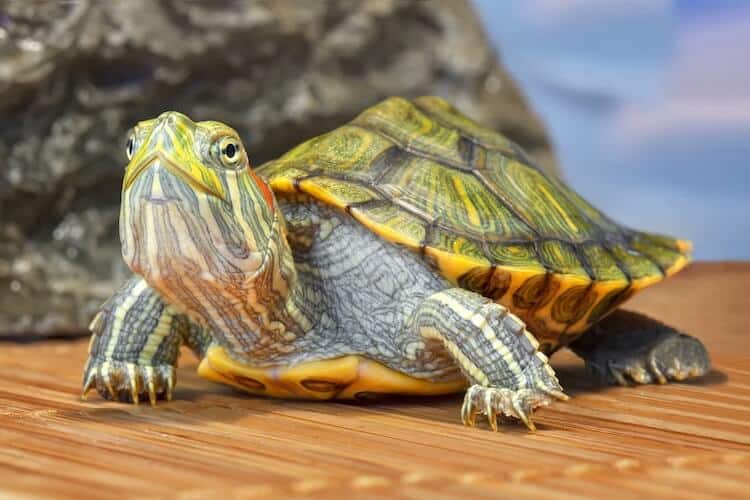Winnebago County Animal Services adopts red-eared sliders to be family pets. Under no circumstances should red-eared sliders be used for food for other animals; for experimentation or laboratory work; or for any other use other than as a family pet. WCAS strictly enforces this policy under the terms of the adoption contract.
About Red-Eared Sliders
Red-Eared Sliders or Red-Eared Terrapins are one of the most commonly kept pet turtle species. They are hardy turtles that do well in an artificial environment. They are a semi-aquatic species meaning that they will spend much of their time in the water but not all of it and will spend a good part of their day on dry land basking.
Red-Eared Slider Size
Captive turtles will growth is influenced by how much food and how much space is available to them. A turtle with a very large environment will grow much larger than one kept in a smaller enclosure. A turtle’s diet will also have the same effect. Full grown adults that have been raised with plenty of space available to them can reach 12 inches in length, with females usually being larger in size. There are rare instances of adult red-eared sliders growing larger than 12 inches.
Red-Eared Slider Life Span
Red-eared sliders can live a long life in captivity. When cared for correctly, they can easily live longer than 20 years.
Insects, Vegetables & Supplements
- Crickets, mealworms or superworms that have been gut loaded.
- Fresh vegetables: mustard greens, collard greens, dandelion greens, or kale.
- Calcium & vitamin D3 supplement powder.
Red-Eared Slider Diet
Red-eared sliders are omnivores. In the wild, they feed on aquatic vegetation, small fish and decaying material such as dead fish and frogs, etc. Pet red-eared sliders will feed on just about anything you give them, but I recommend feeding them a commercial turtle food or pellet to benefit proper growth and health. On occasion, you can offer them leafy greens, freeze-dried shrimp or krill, crickets, superworms or earthworms.
Habitat
Red eared slider housing requirements are more complex than one might think, but not anywhere near unmanageable. Young red eared sliders will do great housed in a 20 gallon aquarium. When the turtle, or turtles if you decide to keep more than one, are full grown then they will most likely require a tank that is a minimum of 50 gallons.
Ideally you should provide 10 gallons of water for each inch of shell length for each turtle. So a 4 inch long turtle would need about 40 gallons of water and two 4 inch long turtles would need around 80 gallons of water. Red eared sliders will do fine in a smaller tank but an ideal living space would follow that formula.
As you can imagine, a turtle that can grow upwards of 12 inches will require quite a bit of space to move around. The enclosure should include an area to swim that is at least 8 inches in depth, and a dry area for the turtle to bask or walk around.
Most pet stores will sell a floating turtle dock that will satisfy the dry land area requirement. This will provide your turtle with a place to rest, and bask to regulate body temperature. Bricks, stones and other such items can also be stacked in the tank to provide a basking spot. It is useful to have a filtration system. Turtles in general tend to make a mess of things, and defecate fairly regularly. You can count on changing the water every week, or a percentage of the water every week depending on the type of filter you purchase.
Heating / Lighting
Turtles do not have the ability to maintain their body temperature metabolically. Instead, they rely on the environment to provide the warmth they need to survive. Since most red eared slider owners keep their turtles indoors, it is their responsibility to provide adequate heating and lightning to keep their pet healthy.
Temperatures can be kept constant by using a submersible water heater. If this is not enough to maintain an ambient temperature close to 740F plus or minus 6 degrees, then you might consider purchasing a basking light. A basking light is recommended and she be place such that water will not splash onto the bulb.
This species will also need some source of UV lightning, as it helps them metabolize vitamin D that helps fend off metabolic bone disease. UVB light bulbs are available at most pet stores.
Source: ARL – Animal Rescue League of Iowa, Inc. 2018 – https://www.arl-iowa.org/
